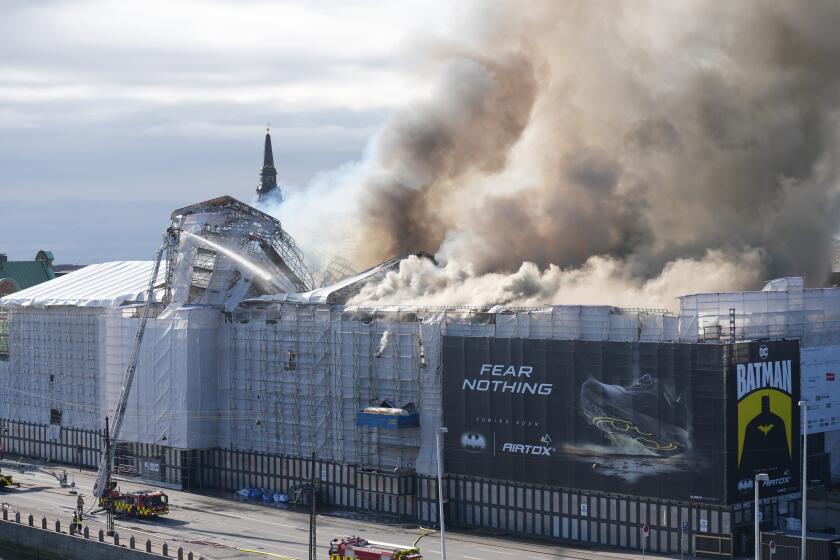Jihad deja vu
IN EARLY MAY 1857 -- 150 years ago this month -- the British empire found itself threatened by the largest and bloodiest anti-colonial revolt to face any European empire anywhere in the world during the 19th century.
The British had been trading in India through the East India Co. since the early 1600s. But in the late 1700s, the dynamic had begun to shift. A new group of conservatives came to power, determined to radically expand British power abroad and to defend the economic interests of Britain against all threats. The governor general of India, Lord Wellesley, called his new, aggressive approach the “forward policy.” Wellesley was determined to establish British dominance over all its European rivals, and he firmly believed in removing hostile Muslim regimes preemptively if they presumed to resist the West’s growing power.
There were many voices in the right-wing press supporting this view. They argued that the puppet Muslim allies that effectively allowed the empire to run their affairs could stay for the time being, but that those governments that were intent on resisting the advance of the West were simply not to be tolerated.
Nor was there any doubt who would be the first to go: a dictator whose family had usurped power in a military coup. According to British sources close to government, he was “a cruel and relentless enemy,” an “intolerant bigot,” a “furious fanatic” who had “perpetually on his tongue the projects of jihad.” This dictator was also deemed to be an “oppressive and unjust ruler ... [and a] perfidious negotiator.”
Wellesley had arrived in India in 1798 with specific instructions to effect regime change and replace this dictator -- Tipu Sultan of Mysore -- with a Western-backed puppet. First, however, Wellesley had to justify publicly a policy the outcome of which had already been decided in private. It was only by marshaling a body of apparently persuasive evidence against opponents that the bellyaching anti-imperialists at home -- in this case the coterie that had gathered around the statesman and political theorist Edmund Burke -- could be shut up.
It was with this in mind that Wellesley and his allies began a comprehensive campaign of vilification against Tipu, portraying him as a vicious and aggressive Muslim monster who planned to wipe the British off the map of India. This essay in imperial villain-making duly opened the way for a lucrative conquest and the installation of a more pliable regime.
The British, however, were not satisfied with removing Tipu. As the years passed, they slowly progressed from removing threatening Muslim rulers to destabilizing even the most malleable Islamic states and annexing them to British India. In February 1856, they annexed the prosperous kingdom of Avadh on the somewhat lame excuse that the Nawab, or provincial governor, was “excessively debauched.” By early 1857, the East India Co. was directly ruling about two-thirds of the subcontinent.
Moreover, many British officials who believed in the forward policy were nursing plans to impose not just British laws and technology on India but British values as well. This meant banning the burning of widows, allowing them to remarry and outlawing infanticide. An evangelical lobby at home also pressed for increased missionary activity, and India in the 1840s and 1850s slowly filled with pious Christian fundamentalists who wanted not just to rule India but to redeem and improve it.
The tracts of the missionaries reinforced Muslim fears, increasing opposition to British rule and creating a constituency for the rapidly multiplying jihadis determined to stop the rule of the kafir infidels. At the same time, the existence of such “Wahhabi conspiracies” to resist the Christians strengthened the conviction of the evangelicals that a “strong attack” was needed to take on “Muslim fanatics.”
The reaction to this steady crescendo of insensitivity came in 1857 with the Great Mutiny. On a May morning, 300 mutinous Indian soldiers (known as “sepoys”), who had been fighting on behalf of the British, rode into Delhi, massacred every Christian man, woman and child they could find and declared the Mughal emperor to be the leader of a chaotic and officerless army of unpaid peasant soldiers set against the forces of the world’s greatest military power.
Of the 139,000 sepoys of the Bengal army -- the largest modern army in Asia -- all but 7,796 turned against their British masters. In some parts of northern India, such as Avadh, the sepoys were joined by a very large proportion of the population. Atrocities abounded on both sides. The great Mughal capital, caught in the middle of a remarkable cultural flowering, was turned overnight into a battleground.
Though it had many causes and reflected many deeply held political and economic grievances -- particularly the feeling that heathen foreigners were interfering in a part of the world where they were entirely alien -- the uprising was nevertheless articulated as a war of religion, and especially as a defensive action against the rapid inroads missionaries and Christian ideas were making in India.
Although the great majority of the sepoys were Hindus, a flag of jihad was raised in the principal mosque in Delhi, and many of the insurgents described themselves as “mujahedin” or “jihadis.” Indeed, by the end of the siege, the proportion of jihadis in the rebellion’s storm center of Delhi grew to be about half of the total rebel force and included a regiment of “suicide ghazis” who had vowed never to eat again and to fight until they met death at the hands of the kafirs.
Finally, on Sept. 14, 1857, the British assaulted and took the city, sacking the Mughal capital and massacring innocent civilians along with the sepoys and the jihadis. In one neighborhood alone, Kucha Chelan, 1,400 unarmed citizens of Delhi were cut down.
In addition to the obvious historical parallels, there is a direct link between the jihadis of 1857 and those we face today. The reaction of some of the Islamic scholars after 1857 was to reject the West in favor of a return to pure Islamic roots. A Wahhabi-like madrasa was founded at Deoband in India that went back to Koranic basics. One hundred and forty years later, the movement has spread, and it was out of Deobandi madrasas in Pakistan that the Taliban emerged to create the most retrograde Islamic regime in modern history, a regime that in turn provided the crucible out of which emerged Al Qaeda.
So does history repeat itself. Not only are Westerners again playing their old game of installing puppet regimes, propped up by Western garrisons, for their own political ends, but more alarmingly, the intellectual attitudes that have sustained such adventures remain intact.
Old-style Orientalism is alive and kicking, its prejudices intact, with Mark Steyn, Daniel Pipes, Samuel Huntington and Charles Krauthammer in the role of the new James Mills and Thomas Macaulays. Through their pens -- blissfully unencumbered by any experience of the Muslim world -- the old colonial idea of the Muslim ruler as the decadent Oriental despot lives on, and, as before, it is effortlessly projected on a credulous public to justify imperial projects.
Today, suicide jihadis fight what they see as a defensive action against their Christian enemies, and West and East again face each other uneasily across a divide that many see as religious war. As ever, it is innocent civilians who are slaughtered. As before, Western evangelical politicians are apt to cast their enemies in the role of “incarnate fiends” and simplistically conflate resistance to invasion and occupation with “pure evil.” And Western countries, blind to the effects of their foreign policies, feel aggrieved and surprised to be attacked by -- as they see it -- mindless fanatics.
Yet as we have seen in our own time, nothing so easily radicalizes a people against us as aggressive Western intrusion in the East. The histories of Islamic fundamentalism and Western imperialism have often been closely, and dangerously, intertwined. There are clear lessons here. For, in the celebrated words of Edmund Burke, those who fail to learn from history are always destined to repeat it.
More to Read
Start your day right
Sign up for Essential California for news, features and recommendations from the L.A. Times and beyond in your inbox six days a week.
You may occasionally receive promotional content from the Los Angeles Times.






